(完整word版)一般现在时(实义动词)--一般疑问句
(完整word版)八种时态主动语态被动语态
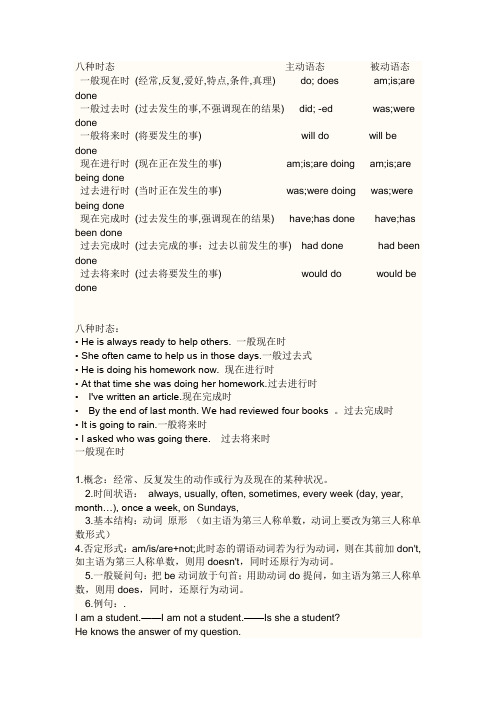
八种时态主动语态被动语态一般现在时(经常,反复,爱好,特点,条件,真理) do; does am;is;are done一般过去时(过去发生的事,不强调现在的结果) did; -ed was;were done一般将来时(将要发生的事) will do will be done现在进行时(现在正在发生的事) am;is;are doing am;is;are being done过去进行时(当时正在发生的事) was;were doing was;were being done现在完成时(过去发生的事,强调现在的结果) have;has done have;has been done过去完成时(过去完成的事;过去以前发生的事) had done had been done过去将来时(过去将要发生的事) would do would be done八种时态:• He is always ready to help others. 一般现在时• She often came to help us in those days.一般过去式• He is doing his homework now. 现在进行时• At that time she was doing her homework.过去进行时• I've written an article.现在完成时• By the end of last month. We had reviewed four books 。
过去完成时• It is going to rain.一般将来时• I asked who was going there. 过去将来时一般现在时1.概念:经常、反复发生的动作或行为及现在的某种状况。
2.时间状语:always, usually, often, sometimes, every week (day, year, month…), once a week, on Sundays,3.基本结构:动词原形(如主语为第三人称单数,动词上要改为第三人称单数形式)4.否定形式:am/is/are+not;此时态的谓语动词若为行为动词,则在其前加don't,如主语为第三人称单数,则用doesn't,同时还原行为动词。
(完整word版)初中英语一般疑问句与特殊疑问句小结
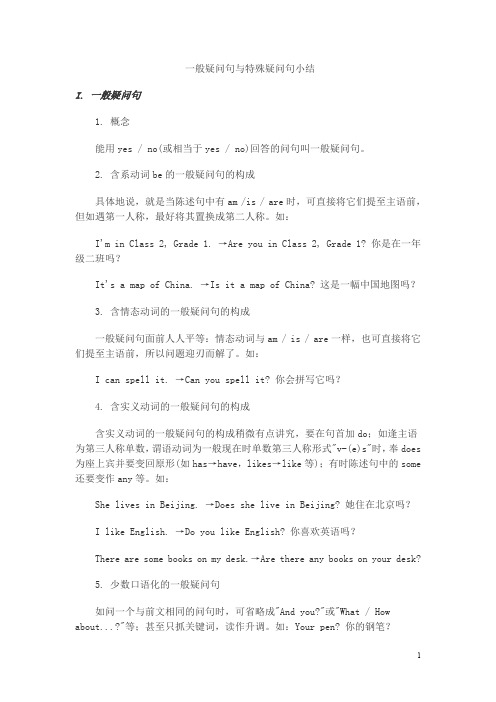
一般疑问句与特殊疑问句小结I. 一般疑问句1. 概念能用yes / no(或相当于yes / no)回答的问句叫一般疑问句。
2. 含系动词be的一般疑问句的构成具体地说,就是当陈述句中有am /is / are时,可直接将它们提至主语前,但如遇第一人称,最好将其置换成第二人称。
如:I'm in Class 2, Grade 1. →Are you in Class 2, Grade 1? 你是在一年级二班吗?It's a map of China. →Is it a m ap of China? 这是一幅中国地图吗?3. 含情态动词的一般疑问句的构成一般疑问句面前人人平等:情态动词与am / is / are一样,也可直接将它们提至主语前,所以问题迎刃而解了。
如:I can spell it. →Can you spell it? 你会拼写它吗?4. 含实义动词的一般疑问句的构成含实义动词的一般疑问句的构成稍微有点讲究,要在句首加do;如逢主语为第三人称单数,谓语动词为一般现在时单数第三人称形式"v-(e)s"时,奉does 为座上宾并要变回原形(如has→have,likes→like等);有时陈述句中的some 还要变作any等。
如:She lives in Beijing. →Does she live in Beijing? 她住在北京吗?I like English. →Do you like English? 你喜欢英语吗?There are some books on my desk.→Are there any books on your desk?5. 少数口语化的一般疑问句如问一个与前文相同的问句时,可省略成"And you?"或"What / How about...?"等;甚至只抓关键词,读作升调。
动词八大时态用法以及练习总结精华(可编辑修改word版)

一般现在时态一、一般现在时的用法:1、表示经常或者反复发生的动作. 如: 我每天吃午饭. I have lunch every day.2、还表示现在存在的一种状态. 如:我姐姐是一位老师.My sister is a teacher.3、客观真理,客观存在,科学事实。
例如:The earth moves around the sun.地球绕着太阳转。
二、一般现在时态经常与often(经常)sometimes(有时)always(总是)usually (通常)等频率词连用,也经常与every day(每天), every week(每周), every month(每月), every term(每学期), every year(每年), once a week (一周一次),twice a year(一年两次)等表示时间的词连用。
三、第三人称单数问题一般现在时中,当主语是第三人称单数时,即常在动词原形后加-s 或-es。
四、一般现在时分类:1.一般现在时态分为be 动词的一般现在时。
1)be 动词包括am,is,are. 中文为"是",这三个词的用法要随着主语的变化而变化。
"am" 用于第一人称单数(I); "is" 用于第三人称单数(he,she,it); "are "用于第一人称复数(we),第二人称单数和复数(you), 第三人称复数(they)。
可以记住以下顺口溜:am 管"我",is 管",她,它,他",are 管"大家"。
一般疑问句和否定句:把be 动词"am,is,are" 放在句首,回答时也要使用be 动词;变为否定句时,把表示否定的not 放在"am is are" 的后面, 其中可以简写为:is not---- isn't ;are not---- aren't;am not 没有简写形式。
一般现在时(word版本可点主页查找)
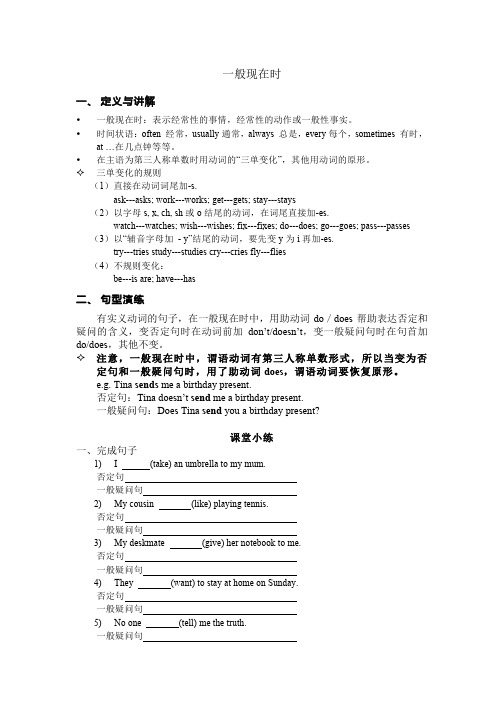
一般现在时一、定义与讲解•一般现在时:表示经常性的事情,经常性的动作或一般性事实。
•时间状语:often 经常,usually通常,always 总是,every每个,sometimes 有时,at …在几点钟等等。
•在主语为第三人称单数时用动词的“三单变化”,其他用动词的原形。
²三单变化的规则(1)直接在动词词尾加-s.ask---asks; work---works; get---gets; stay---stays(2)以字母s, x, ch, sh或o结尾的动词,在词尾直接加-es.watch---watches; wish---wishes; fix---fixes; do---does; go---goes; pass---passes (3)以“辅音字母加- y”结尾的动词,要先变y为i再加-es.try---tries study---studies cry---cries fly---flies(4)不规则变化:be---is are; have---has二、句型演练有实义动词的句子,在一般现在时中,用助动词do/does帮助表达否定和疑问的含义,变否定句时在动词前加don’t/doesn’t,变一般疑问句时在句首加do/does,其他不变。
²注意,一般现在时中,谓语动词有第三人称单数形式,所以当变为否定句和一般疑问句时,用了助动词does,谓语动词要恢复原形。
e.g. Tina sends me a birthday present.否定句:Tina doesn’t send me a birthday present.一般疑问句:Does Tina send you a birthday present?课堂小练一、完成句子1)I (take) an umbrella to my mum.否定句一般疑问句2)My cousin (like) playing tennis.否定句一般疑问句3)My deskmate (give) her notebook to me.否定句一般疑问句4)They (want) to stay at home on Sunday.否定句一般疑问句5)No one (tell) me the truth.一般疑问句二、用所给词的正确形式填空1. Mike ______(like) cooking.2. They_______ (have) the same hobby.3. My aunt______ (look) after her baby carefully.4. You always____ (do) your homework well.5. I_____ (be) ill. I’m staying in bed.6. She_____ (go) to school from Monday to Friday.7. Liu Tao _____(do) not like PE.8. The child often______ (watch) TV in the evening.9. Su Hai and Su Yang ______(have) eight lessons this term.10. There_______ (be) some water in the bottle.11. What ____they often ____(do) on Saturdays12. Your parents________ (read) newspapers every day?13. -What day ______(be) it today? -It’s Saturday.14. Don’t make a noise. Grandpa __________(sleep).15. Tom’s family__________(watch) TV.16. It ________(take) me two hours to finish my homework last night.17. What ______ your mother _______(do) every evening? She _______(wash) clothes.18. _______ it ______ (rain)every day?19. What _______(do) you _______ on Sundays ? We ________ (play) football.20. They often ________ (visit) the Great Wall.21. Who _______ (dance) the best in your class?22. He _____________ (not come).23. The earth __________ (move) round the sun.24. She ________ (buy) a sweater.25. Mr. Wang often______( go) to Shanghai.课后习题一、写出下列动词的第三人称单数形式:wash______ match______guess______ study______ finish________ go_______ snow______ carry________stop______ see________ drive _______let_______ carry______ keep_____ join______ find_______ think________ teach______ catch______stay_______ begin______ forget_______ forget______ lie_______ die _______ run_______ prefer______ give________ ring_______ dance______一、用所给词的正确形式填空1. We often___________(play) on the playground.2. He _________(get) up at six o’clock.3. __________you _________(brush) your teeth every morning?4.5. Danny _______(study) English, Chinese, Maths, Science and Art at school.6. Mike sometimes __________(go) to the park with his sister.7. She and I _______(take) a walk together every evening.8. ________ Mike________(read) English every day?9. The girl______ (teach) us English on Sundays.10. There ________ (be) a football match on TV every morning.11. He often ______(have) dinner at home.12. Daniel and Tommy___ (be) in Class One.13. We______ ______ (not watch) TV on Monday.14. Nick ______ ______ (not go) to the zoo on Sunday.15. They______ (like) the World Cup.三、改句子1.Mrs. Smith wants some beef.否定句一般疑问句2.She doesn’t like drinking coffee.肯定句一般疑问句3.Tom does his homework at home.否定句一般疑问句4.The girl doesn’t go into the shop.肯定句一般疑问句5.Mike has two letters for him.否定句一般疑问句。
(完整)英语一般疑问句(语法)
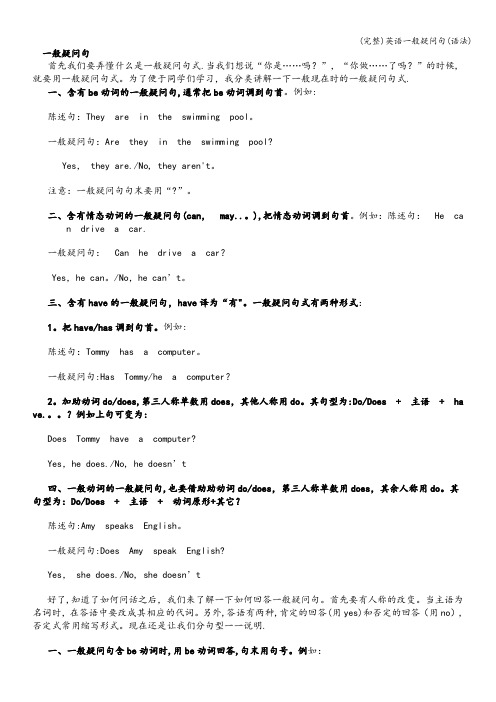
一般疑问句首先我们要弄懂什么是一般疑问句式.当我们想说“你是……吗?”,“你做……了吗?”的时候,就要用一般疑问句式。
为了便于同学们学习,我分类讲解一下一般现在时的一般疑问句式.一、含有be动词的一般疑问句,通常把be动词调到句首。
例如:陈述句:They are in the swimming pool。
一般疑问句:Are they in the swimming pool?Yes, they are./No, they aren't。
注意:一般疑问句句末要用“?”。
二、含有情态动词的一般疑问句(can,may..。
),把情态动词调到句首。
例如:陈述句: He can drive a car.一般疑问句:Can he drive a car?Yes,he can。
/No,he can’t。
三、含有have的一般疑问句,have译为“有"。
一般疑问句式有两种形式:1。
把have/has调到句首。
例如:陈述句:Tommy has a computer。
一般疑问句:Has Tommy/he a computer?2。
加助动词do/does,第三人称单数用does,其他人称用do。
其句型为:Do/Does + 主语+ ha ve.。
?例如上句可变为:Does Tommy have a computer?Yes,he does./No, he doesn’t四、一般动词的一般疑问句,也要借助助动词do/does,第三人称单数用does,其余人称用do。
其句型为:Do/Does + 主语+ 动词原形+其它?陈述句:Amy speaks English。
一般疑问句:Does Amy speak English?Yes, she does./No, she doesn’t好了,知道了如何问话之后,我们来了解一下如何回答一般疑问句。
首先要有人称的改变。
当主语为名词时,在答语中要改成其相应的代词。
(完整word)一般现在时

一般现在时一般现在时表现在1. 表示现在经常性或习惯性的动作。
如:My sister wears glasses. 我妹妹戴眼镜。
He often goes to the cinema。
他经常去看电影。
【注】询问某人的习惯时,有时还可用ever。
如:“Do you ever eat meat?" “No, I never eat meat."“你吃肉吗?”“从不吃肉。
”2. 表示现在(或经常性)的情况或状态。
如:Mother is ill. 母亲病了。
He is always like that. 他总是那样.He likes living in the country。
他喜欢住在乡下.We need a lot of money. 我们需要一大笔钱。
3。
表示现在的能力、特征、职业等.如:He sings well。
他唱歌唱得好。
Mr. Smith teaches French。
史密斯先生教法语。
4。
表示客观真理、科学事实、格言以及不受时间限制的客观存在.如:Summer follows spring. 春去夏来.Knowledge is power. 知识就是力量。
The earth turns around the sun。
地球绕着太阳转。
一般现在时表将来1。
当主句为将来时态或表示将来意义时,时间和条件的状语从句必须用一般现在时表将来。
如: I'll write to her when I have time. 我有空会给她写信.Turn off the lights before you leave。
走前关灯。
If we hurry, we may catch the bus。
如果赶紧走我们可能赶得上公共汽车.Tell me in case you get into difficulty. 遇到困难请告诉我。
【注】① 除表示时间和条件的状语从句外,表示让步、相似、比例的从句也必须用一般现在时表示将来。
(完整word版)一般现在时态
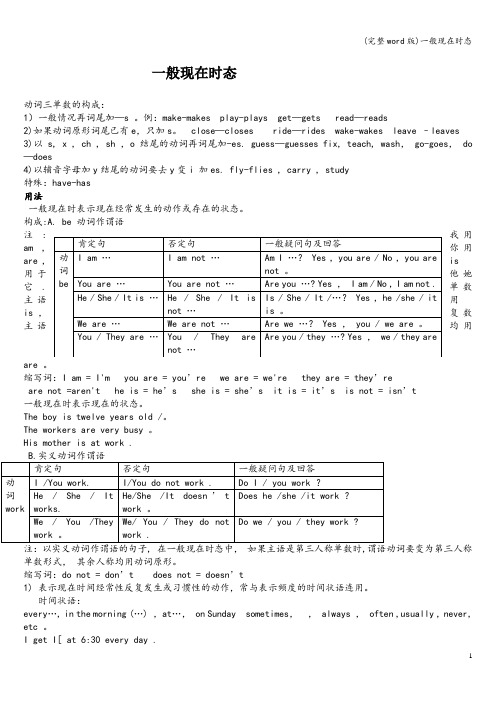
一般现在时态动词三单数的构成:1)一般情况再词尾加—s 。
例:make-makes play-plays get—gets read—reads2)如果动词原形词尾已有e,只加s。
close—closes ride—rides wake-wakes leave –leaves3)以s, x , ch , sh ,o 结尾的动词再词尾加-es. guess—guesses fix, teach, wash, go-goes, do —does4)以辅音字母加y结尾的动词要去y变i 加es. fly-flies , carry , study特殊:have-has用法一般现在时表示现在经常发生的动作或存在的状态。
构成:A. be 动词作谓语注: 我用Array am , 你用are , is用于他她它.单数主语用is ,复数主语均用are 。
缩写词:I am = I'm you are = you’re we are = we're they are = they’reare not =aren't he is = he’s she is = she’s it is = it’s is not = isn’t一般现在时表示现在的状态。
The boy is twelve years old /。
The workers are very busy 。
His mother is at work .单数形式,其余人称均用动词原形。
缩写词:do not = don’t does not = doesn’t1) 表示现在时间经常性反复发生或习惯性的动作,常与表示频度的时间状语连用。
时间状语:every…, in the morning (…) ,at…, on Sunday sometimes,, always , often ,usually , never, etc 。
I get I[ at 6:30 every day .She always helps others .He often goes to school on foot.I usually leave home for school at 7 every morning。
(word完整版)史上最全 英语中的16种时态
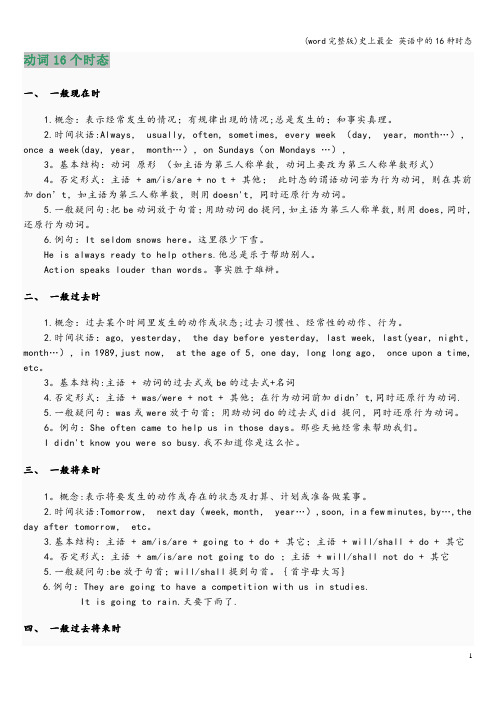
动词16个时态一、一般现在时1.概念:表示经常发生的情况;有规律出现的情况;总是发生的;和事实真理。
2.时间状语:Always, usually, often, sometimes, every week (day,year, month…),once a week(day, year,month…),on Sundays(on Mondays …),3。
基本结构:动词原形(如主语为第三人称单数,动词上要改为第三人称单数形式)4。
否定形式:主语 + am/is/are + no t + 其他;此时态的谓语动词若为行为动词,则在其前加don’t,如主语为第三人称单数,则用doesn't,同时还原行为动词。
5.一般疑问句:把be动词放于句首;用助动词do提问,如主语为第三人称单数,则用does,同时,还原行为动词。
6.例句:It seldom snows here。
这里很少下雪。
He is always ready to help others.他总是乐于帮助别人。
Action speaks louder than words。
事实胜于雄辩。
二、一般过去时1.概念:过去某个时间里发生的动作或状态;过去习惯性、经常性的动作、行为。
2.时间状语:ago, yesterday, the day before yesterday, last week, last(year, night,month…),in 1989,just now, at the age of 5,one day, long long ago, once upon a time, etc。
3。
基本结构:主语 + 动词的过去式或be的过去式+名词4.否定形式:主语 + was/were + not + 其他;在行为动词前加didn’t,同时还原行为动词.5.一般疑问句:was或were放于句首;用助动词do的过去式did 提问,同时还原行为动词。
